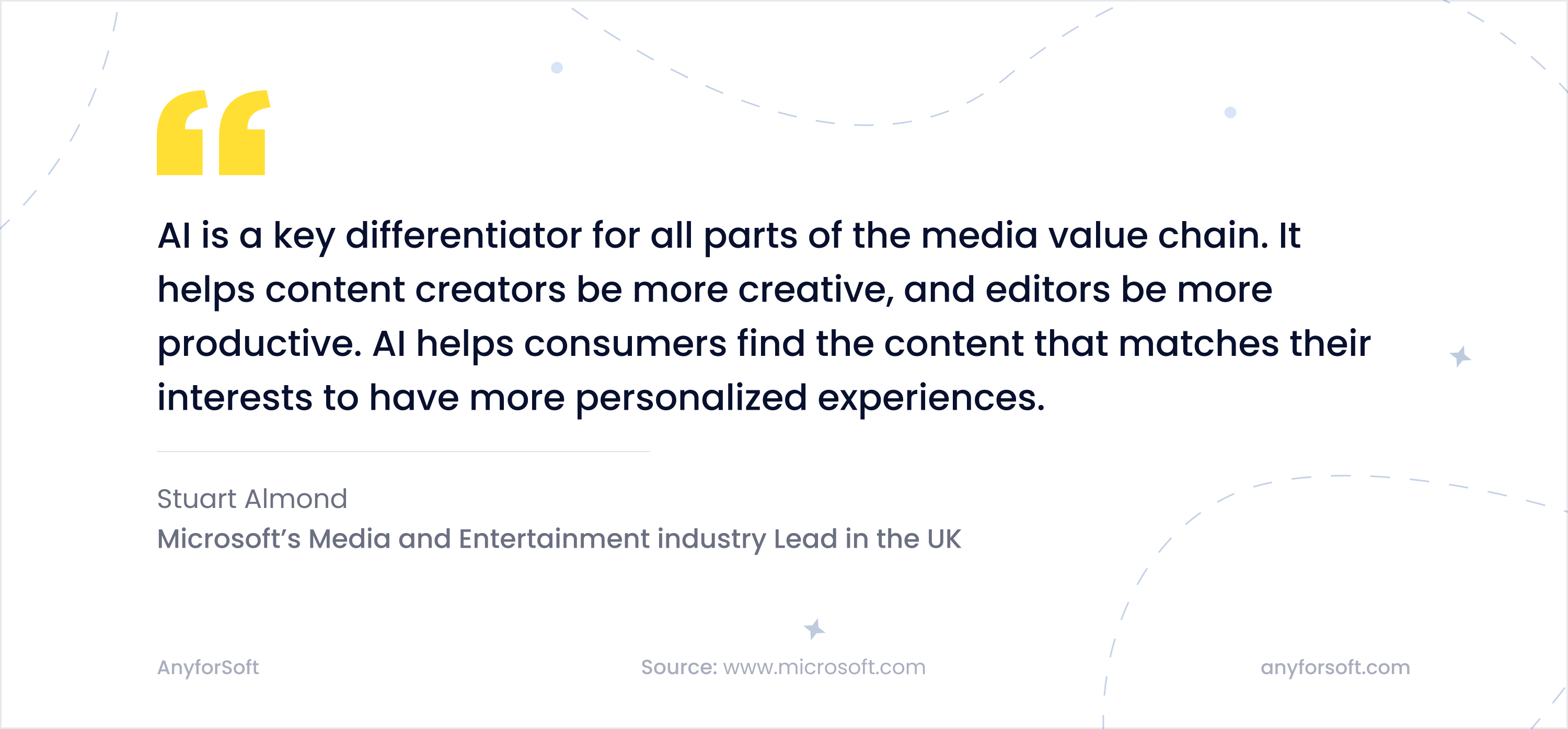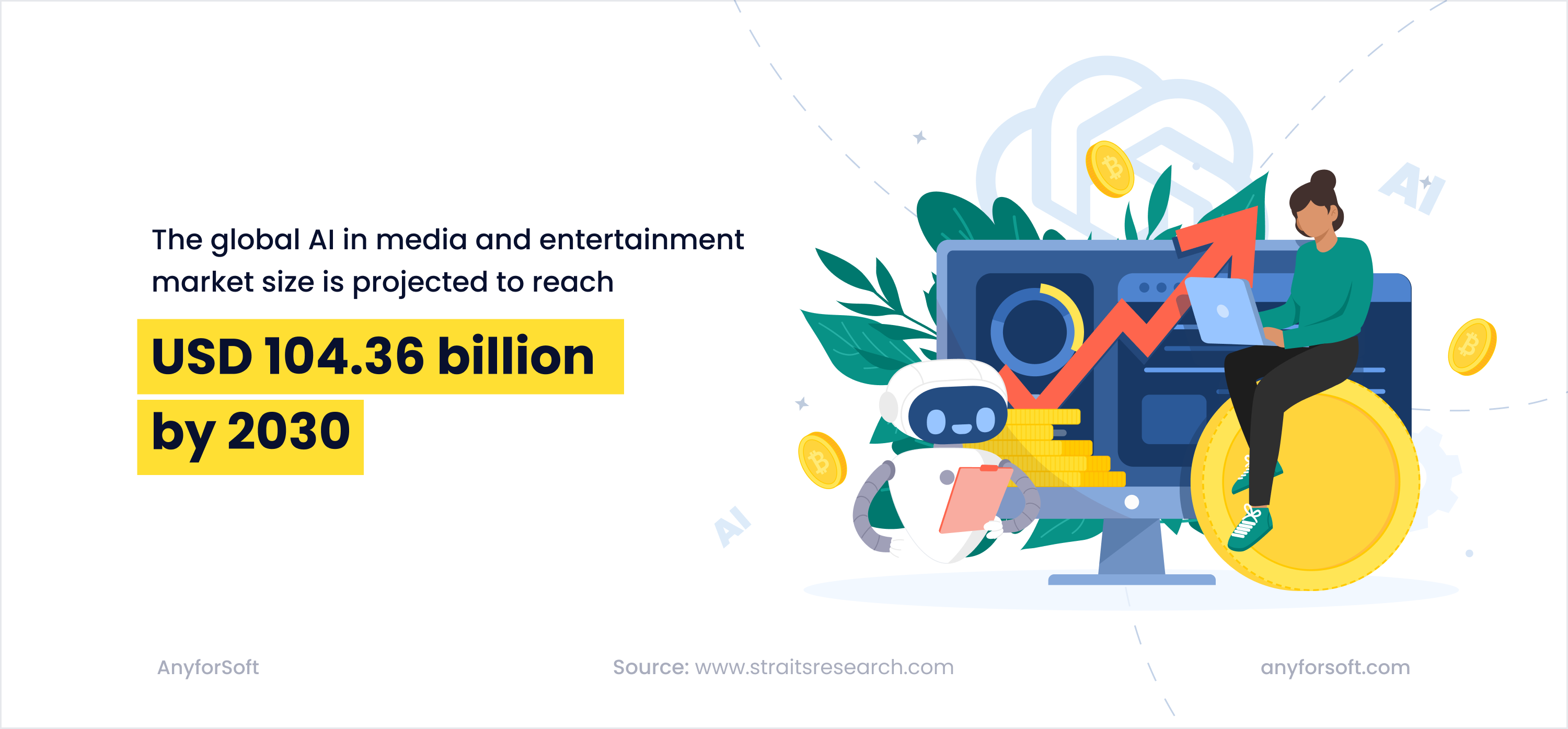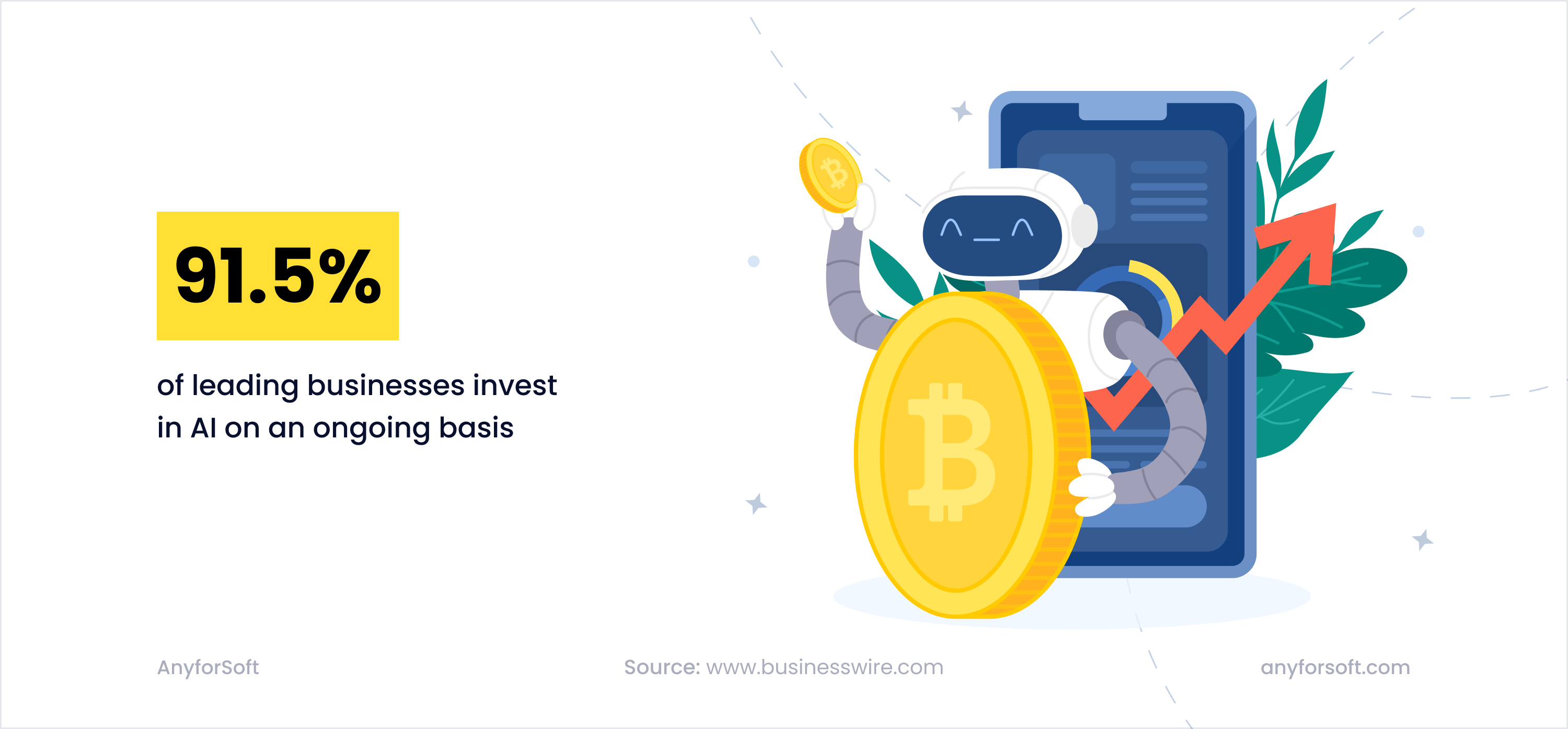Artificial intelligence (AI) has been a topic of discussion from the moment the idea appeared until the actual implementation of practical solutions. Today you won't surprise anyone with the prefix AI next to the name of a service or application, although technological, ethical, financial, and commercial issues constantly rage around the use of AI in various fields.

Nevertheless, artificial intelligence is continually gaining popularity and is widely used in Entertainment, and each modern media and entertainment software development company prepares robust and revolutionary solutions. But is it such a helpful assistant as its creators and active users claim? Let's take a look at the example of AI in media and entertainment.
AI In Media and Entertainment: Impact on the Industry
The entertainment industry is with us everywhere we go. It is in our gadgets and everyday routine surrounding us through radio, music, games, video, or text content. Modern media and entertainment companies made a lot of efforts to enter into almost all our everyday activities. Ironically, this is precisely what AI tools made for the media and entertainment industry, replacing old processes with new automated ones. For example, media giants like Netflix, 20th Century Fox, and IBM have already applied computer vision and machine learning algorithms to work with video content and recommendations.

Artificial intelligence is responsible for various things, from social media management to content personalization. So, what exactly does AI for the media do?
Content creation: AI in media and entertainment is being used to create news articles, sports reports, financial reports, and other types of content. AI algorithms can analyze data, identify trends, and generate content in a matter of seconds. It helps media businesses to create more content at a faster pace and with greater accuracy, getting a competitive advantage.
Personalized content delivery: AI algorithms analyzes user data and behavior to deliver personalized content to each of them, helping media and entertainment companies to increase engagement and retention rates.
Advertising: AI applications help to deliver more targeted and relevant ads to the audience. By analyzing user data, AI algorithms can identify user preferences and interests and serve them with ads that are more likely to resonate with them.
Content curation: Artificial intelligence helps to curate media content for the audience by analyzing user behavior and interests, assisting in building a more engaging and relevant user experience.
Content moderation: AI moderates user-generated content more efficiently and accurately. It can analyze text, images, and videos to identify inappropriate or offensive content, which can then be removed or flagged for review. It is also helpful to filter fake news and find the source of it.
Of course, there are also potential drawbacks to using AI in media industry. One concern is the potential for bias in AI algorithms, which can perpetuate existing social and cultural preferences. Moreover, there are concerns about data privacy and the ethics of using facial recognition technology for surveillance.
What are the Benefits of AI in media and entertainment industry?
With its ability to automate many processes, analyze large amounts of data, and provide insight that informs decision-making, AI in media and entertainment has the potential to change the way media companies operate. Well, we can already see it: all those recommendations based on our preferences made by various services and streaming platforms are made by using AI.
- Personalized content delivery. Media professionals can increase user engagement and retention rates by delivering personalized recommendations for movies, TV shows, and music.
- Automation and increased efficiency. AI can automate many processes, such as content moderation, data analysis, and more. It leads to reducing costs and increasing efficiency. This also frees up valuable time and resources that can be invested in higher-value tasks, such as content creation and strategy.
- Predictive analytics. Machine learning tools and AI models can analyze large amounts of data to identify trends and predict future outcomes. This can help media businesses to make more informed decisions about content creation, advertising, and other areas.
- Improved user experience. AI can help companies create a more engaging and personalized user experience, increasing user satisfaction and loyalty.
- Enhanced ad recommendations. AI is also used for marketing purposes. It can analyze user data to deliver more targeted and relevant advertising, increasing the chances of conversion and generating more revenue for businesses.
- Upgraded content moderation. With the rise of fake content and deepfakes, it's becoming increasingly difficult to distinguish between natural and manipulated media. AI tools such as facial recognition technology can help media companies to identify and remove fake news, protecting their users from misinformation and preserving the integrity of their platforms.
Despite its numerous benefits, artificial intelligence in the media industry also presents some challenges that must be addressed for successful implementation. However, as AI technology evolves and improves, businesses in the media sector will undoubtedly continue to benefit from its use.
Applications of AI in the Media and Entertainment Industry
From music to social media, AI significantly impacts various entertainment sectors, and its potential is seemingly endless. Here are some examples of AI applications in significant media areas:
Music
Content creators use AI tools to generate advanced audio features, including timbre. It is also being applied by music apps and platforms to personalize music production, provide customized content, and enhance playback to allow users to control the sound.
Visual Arts
Artificial intelligence in media is being applied to generate art images, pastiches, and images from captions in visual arts. It can also reproduce scene-dependent image transformations, style-based image transformations, image inpainting, image retrieval based on text or graphic features, and image quality improvement. Automated metadata creation, object detection, and face recognition algorithms are also enabled.
Digital Storytelling
AI is powering cinematography, transmedia storytelling, authoring tools for non-experts, sensor-based storytelling for immersive experiences, and searching archives to discover content that best fits the narrative. Audio segmentation and multimodal interactive and virtual experiences are also possible due to AI within the content production stage.
Games, Movies, Engineering, and Design
AI and media are the perfect duos for this part of the industry. AI is being used to enable automated content synthesis, by-example synthesis, and generative game design. As a result, users can benefit from personalized games that are adjusted to their gamer profiles. Moreover, it is used for film promotion and improved video streaming.
Book Publishing
AI greatly relieves the publication process by automating all the work for the publishing houses. It also helps improve accessibility for people with print impairments and provides personalized book recommendations.
Media Access Services
AI solutions for this sector encompass sign language production, audio description of the content, and automatic subtitling.
News
AI can become a must-have option for up-to-date news portals development, as it is a powerful tool for media outlets, facilitating fact-checking, analysis, cross-examination of information sources, content verification (e.g., deep fakes detection), social network analysis (disinformation detection), and automated generation of personalized news digests. It leads to automating news production and some concerns connected to automated journalism that can replace humans in this area.
Social Media
AI is used to enhance social media functions, like enabling content personalization, developing recommender systems, enhancing content search and moderation, ad placement, and trend identification. It is also a practical approach to opinion mining for more in-depth social media analysis.
Overall, the impact of artificial intelligence is significant and continues to grow. As AI technology keeps advancing, it is likely that we will see even more innovative uses of AI in the media and entertainment industry in the years to come.
AI in media and entertainment: real-world examples
Let's take a look at real AI applications in the media and entertainment sector:
- Netflix. Netflix is leveraging AI algorithms to analyze user viewing habits and personalize content delivery. Their recommendation engine accounts for a significant portion of the content users watch on the platform.
- Spotify. The platform employs AI to curate personalized playlists like Discover Weekly and Daily Mixes by analyzing users’ listening habits and preferences. Thanks to its personalized recommendations, users spend more time within the app.
- Warner Bros. The company Utilizes AI from Cinelytic to predict the success of movies. The system analyzes data to aid in decision-making for marketing and distribution strategies.
- LyricFind. LyricFind uses AI technologies to power its lyrics search engine. Having natural language processing capabilities, it allows users to search for lyrics using natural language queries.
- Ubisoft’s Ghostwriter. This AI tool is designed to help scriptwriters create dialogue and narrative content, saving time and enhancing creativity in game development.
- DeepMotion. DeepMotion is an AI-powered tool that can create realistic 3D animations for movies and video games.
The Future of Artificial Intelligence in The Media Sphere
What the future of AI in media and entertainment industry looks like?
Artificial intelligence is already making its mark in the media sector, revolutionizing how content is produced, distributed, and consumed. However, its is not limited as the technology continues to evolve and new use cases emerge.
One area where AI is expected to impact in the future significantly is live broadcasting. With advances in facial recognition technology and real-time analytics, AI can help broadcasters tailor their content to specific audiences, enhancing engagement and interactivity. For example, AI-powered cameras can detect viewers' emotions and adjust the content accordingly, while AI-generated graphics provide real-time data visualization.
Another promising area for AI in media and entertainment is combating fake content. As the problem of deep fakes and disinformation grows, AI can play a crucial role in detecting and removing such content. Machine learning algorithms can analyze large amounts of data to identify patterns and anomalies, helping to flag potentially fraudulent content. AI can also verify the authenticity of images and videos by analyzing metadata, source information, and other contextual clues.
Moreover, AI can help companies optimize content for different platforms and devices. By analyzing user behavior and preferences, AI systems can suggest the best formats, lengths, and styles for different channels, such as social media, mobile, and TV. This can help companies reach broader audiences and increase engagement with their content.
AI in the media industry can also enable new interactive and immersive storytelling forms. With virtual and augmented reality technologies, AI can create personalized, dynamic experiences that adapt to the user's actions and preferences. For example, AI-powered chatbots can provide customized storylines based on the user's responses, while AI-generated music and sound effects can enhance the atmosphere of the experience.

It is also important to note that alongside Artificial intelligence, technologies that ensure its smooth, efficient, and productive work are also developing. For example, Python gains more supporters among developers as it is the preferable tech for AI projects.
Many engineers join the community and contribute new solutions because it is an effective and lightweight technology that allows you to implement the latest disruptive solutions and carry out the digital transformation of many businesses.
However, as AI becomes more integrated into media production and distribution, it raises ethical and legal issues that must be addressed. For example, AI-generated content may raise questions about authorship and intellectual property.
The future of AI in media is promising, with many potential applications that can improve the efficiency, quality, and personalization of content. As technology evolves, it will be crucial for businesses to balance the benefits of AI with ethical and legal considerations, ensuring that the technology is used in ways that benefit both the industry and society. If you need assistance in building an AI-powered solution, our product development team that cares about your success is ready to provide Python development services to fulfill your AI-based idea, feel free to contact our managers to discuss collaboration.
